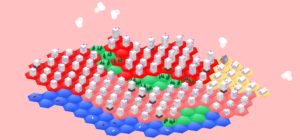Description
Blockchains & Cultural Padlocks is a three-year Research Initiative by 221A that researches, develops sectoral capacity, and implements blockchain technology for cultural, social and ecological use-cases.
From June 5 – 10, 2019, research from the Blockchains & Cultural Padlock‘s Research initiative by Artist Researcher Julian Hou and Research Partner DOMA, was presented at the Blockchain@UBC Summer Institute and Annual Conference. Please visit Pollyanna 圖書館 Library for an open storage display of a textile portfolio developed by Julian Hou with the Associate Artists, Sharona Franklin, Tiziana La Melia, Ron Tran, and Christian Vistan, as well as a multi-player online game currently under development by DOMA.
Project Title: Motives
Output: Feasibility Study
Artist Research: Julian Hou
Associate Artists: Sharona Franklin, Tiziana La Melia, Ron Tran, Christian Vistan
For Blockchains & Cultural Padlocks, Julian Hou develops his research for a feasibility study titled Motives, which proposes a new organization that supports diverse approaches to rural life, in order to prioritize local histories and bio-regional contexts. This proposal identifies the organization as untethered to colonial narratives, with more interest being given to the aesthetic and conceptual reliance on natural motifs, and experimental modes of value-determination in art.
Julian Hou’s research takes up the challenge implicit to blockchain technology’s potential to create alternative forms of community. Hou investigates a number of real-world examples in which blockchains are the foundation of network-based peer communities — e.g., Backfeed’s Ouishare experiment. Taking the lessons that result from such experiments, Hou proposes the terms for a similar experiment, one based on the metaphor of “Anoetic tokenization.” Hou draws from the notion of anoesis, which is a state of mind consisting of pure sensation or emotion without cognitive content. In the artist’s view, anoetic resonance as an organizing principle has the advantage of being “less [a result] of a choice or a cognitive judgment and an undeniable quality of communication and perception.” Taking such an approach helps move the conversation around blockchain beyond human-centric thinking. In researching anoetic resonances, Hou works with, Sharona Franklin, Tiziana La Melia, Ron Tran, and Christian Vistan, to create artworks that embody new attitudes and perceptions about the land by moving beyond the European pastoral context.
Together these artists produced a portfolio entitled Humus comprised of five prints and textile artworks. This collective research has been produced for Motives, a feasibility study by Hou for a new land-based art organization. Hou’s research will be published as part of the report on the initiative’s first phase in early 2020.

Research Partner: DOMA
Projects: Nonprofit Housing Platform and Multiplayer Game
Associate Researchers: Maksym Rokmaniko, Francesco Sebregondi, Francis Tseng
DOMA is a distributed housing platform that will bring renters towards ownership structures, through the digital token economy by creating a network of properties across several cities in Europe. DOMA is a blockchain-based, shared ownership platform for equitable real estate. Bridging the great divide between renting and owning a home, DOMA leverages the principles of the new token economy to support a model of networked home ownership and enables a more fair distribution of value for urban living.
The aim of the platform is to redistribute the economic profits in a fairer way, resulting from the processes of urban regeneration —– so that both the existing and new population of a given neighborhood can benefit from it. In this sense, DOMA can also serve as a strategic tool for the conservation of social, ethnic, and architectural diversity within a given neighbourhood: that diversity, which often constitutes the very trigger of the renewed attention and subsequent urban changes that the area is undergoing, being itself recognized and treated as an urban value.
Operating as a non-profit community development corporation, DOMA continually accumulates existing housing in city centers that provide a positive correlation between the purchase price and rental rate. The network is able to accrue value by capitalizing on this relationship and through the absorbing of costs such as mortgage interest, insurance, and transfer fees.
The platform’s users are token holders and they increase their stock in a housing co-op and pay monthly dues equivalent to market rate for ownership in the network, rather than in a stationary inhabited unit. This allows for movement between network-owned units, providing flexibility with stability. In addition to the rights of occupancy contingent on dues, users maintain voting rights, a data co-op and developer status in a peer-to-peer marketplace, through which they can provide and receive in-home services and goods, utilizing positive equity balance as credit.
DOMA is currently developing a multi-player online game where the player must develop a home and life in a financially enclosed city. The only way to advance your status in the game is to develop economic, social and cultural partnerships which will elevate the player’s status and security. DOMA proposes the game as a way to socialize the kinds of behaviours and sociable interactions that can help make distributed networks succeed in our minds first, as a way to drive the adoption of recommoned housing and urban planning on the blockchain.



